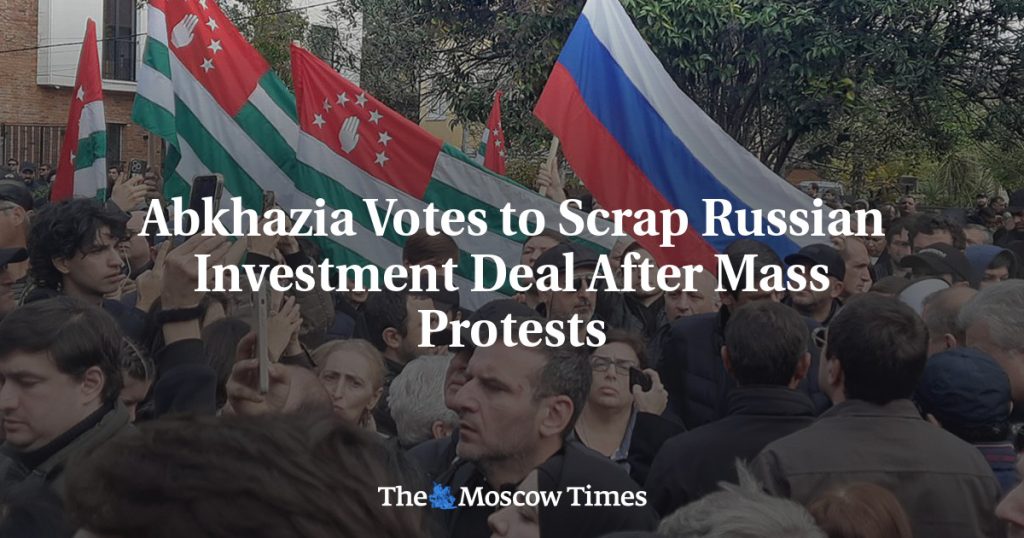Summarize this content to 2000 words in 6 paragraphs
Lawmakers in the Moscow-backed breakaway Georgian region of Abkhazia voted Tuesday to scrap the controversial Russian investment deal that sparked protests and the resignation of its leader.
Abkhazia’s opposition argued that the deal, which spelled out preferential treatment for investments of 2 billion rubles ($18.8 million) and higher, would have allowed wealthy Russians to buy up local property and squeeze out local business.
Abkhazia’s self-styled parliament voted 21-0 to scrap the Russian investment deal, with two abstentions, according to the Apsny local news agency.
Rare demonstrations erupted in mid-November as Abkhazia’s lawmakers were originally due to vote in favor of the investment deal, which the Russian and Abkhazian economy ministers signed on Oct. 30 in Moscow.
Protesters blocked highways and occupied government buildings, accusing then-President Aslan Bzhania of prioritizing Russian economic interests over Abkhazian livelihoods.
Bzhania stepped down and was replaced by his deputy, but has expressed intentions to run again in the Feb. 15 presidential elections.
news
Explainer: How Does Russia Loom Over Abkhazia’s Latest Protests?
Read more
Some opposition lawmakers suggested a reworked Russian investment deal could be signed after the February elections.
Russian media reported that the Kremlin might offer “certain concessions” as part of a broader strategy to dominate the real estate market in Abkhazia, which has become a popular destination for Russian tourists in recent years.
At least one Russian lawmaker suggested that relations with Abkhazia would “suffer” following the protests.
Abkhazia is a lush region nestled between the Black Sea and the Caucasus mountains that is internationally recognized as Georgian territory. Abkhazia, as well as another breakaway Georgian territory of South Ossetia, have been under de-facto Russian control since a brief 2008 war between Moscow and Tbilisi.
A Message from The Moscow Times:
Dear readers,
We are facing unprecedented challenges. Russia’s Prosecutor General’s Office has designated The Moscow Times as an “undesirable” organization, criminalizing our work and putting our staff at risk of prosecution. This follows our earlier unjust labeling as a “foreign agent.”
These actions are direct attempts to silence independent journalism in Russia. The authorities claim our work “discredits the decisions of the Russian leadership.” We see things differently: we strive to provide accurate, unbiased reporting on Russia.
We, the journalists of The Moscow Times, refuse to be silenced. But to continue our work, we need your help.
Your support, no matter how small, makes a world of difference. If you can, please support us monthly starting from just $2. It’s quick to set up, and every contribution makes a significant impact.
By supporting The Moscow Times, you’re defending open, independent journalism in the face of repression. Thank you for standing with us.
Continue
Not ready to support today? Remind me later.
×
Remind me next month
Thank you! Your reminder is set.
We will send you one reminder email a month from now. For details on the personal data we collect and how it is used, please see our Privacy Policy.















